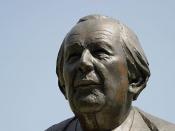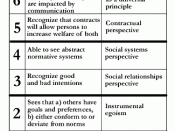Lawrence Kohlberg was born in Bronxville, New York on October 5th in 1927. He served as a professor at Harvard Univarsity. He started as a developmental psychologist in the early 1970s and became famous for his later work in moral education, especially his theory of moral development
For his doctoral research Kolhberg studied differences in children's reasoning about moral dilemmas. He hypothesized that moral difficulties motivated their development through a fixed sequence of increasingly flexible kinds of moral reasoning. He also helped to clarify the general cognitive-developmental approach of Jean Piaget, who he studied under, to the analysis of changes in moral reasoning. This marked the beginning of a life long dedication to the study of Moral Development, especially in children. Kohlberg used surveys as his major source of research methodology. He often presented subjects with moral dilemmas and would evaluate their responses along a set of criteria. Kohlberg was able to demonstrate in his studies that people progressed in their moral reasoning through a series of stages.
Kohlberg's Theory of Moral Development has gained much popularity and is still widely recognized and used today. This theory has many practical applications in real life settings such as elementary school. His theory of moral development was dependent on the thinking of the Swiss psychologist Jean Piaget and the American philosopher John Dewey. He was also inspired by James Mark Baldwin. These men had emphasized that human beings develop philosophically and psychologically in a progressive fashion Kohlberg believed, and was able to demonstrate through studies that people progressed in their moral reasoning (i.e., in their bases for ethical behavior) through a series of stages. Kohlberg based his ideas of moral reasoning on Piaget's moral reasoning and morality of cooperation. He described three main levels of moral development with two stages in each...



Good essay.
Nice Critical Essay, but may I ask if you have a bibliography of all your sources.
thanks. ;)
3 out of 3 people found this comment useful.